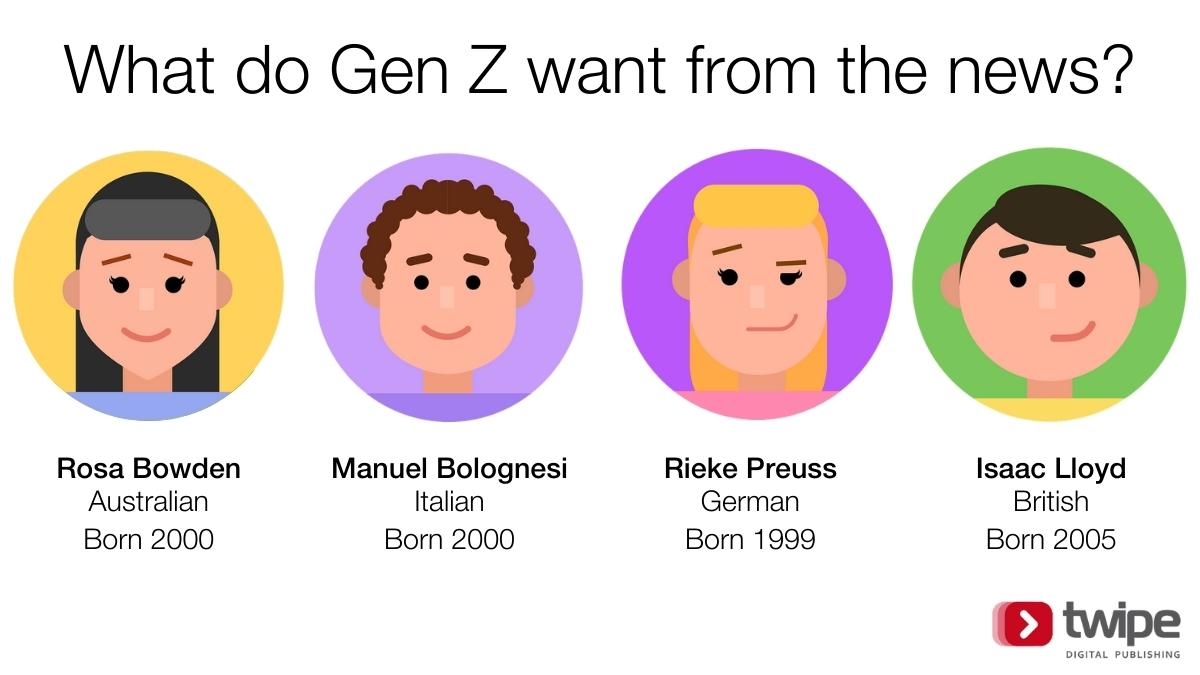|
Getting your Trinity Audio player ready...
|
With 40% of 18-24-year-olds actively avoiding the news, publishers need to rethink their offering. We have spoken with 4 Gen Zers from 4 different countries to discuss what they want from the news. Manuel from Italy and Rieke from Germany both have a direct interest in the news industry. Isaac from the UK is a student, whilst Rosa from Australia has recently graduated and works in Child Care as a Centre Director. Read on to see what we found.

Gen Z want to hear about topics they like, but want to be aware of big news stories
Young people are interested in the news and their interest primarily lies in topics they are passionate about. This doesn’t mean these topics are less important, it just means they are aware of specific issues and themes. This has been the case for generations before them too. As Bente Zerrahn put it in her recent INMA article, “there’s never been a young generation that has not been majorly political”.
Isaac explained that for him and his friends, these topics will impact their generation in years to come like exams and climate change. Here, traditional news publishers can play a role. Isaac is interested in politics, but he’d like to see news publishers use their expertise to focus their political reporting on the issues which will influence his generation, not daily politics affairs. Publishers have the expertise in house so this could be an easy win.
Manuel uses self-curation by searching for topics on Google and choosing articles which catch his eye. This is a way for him to navigate the overwhelming field of news, but not commonly used as Gen Z prefer to search for news on TikTok and Instagram. Personalisation could also play a role in filtering this news for him. In fact YouGov found that 71% of Gen Z prefer personalised experiences. Rieke consumes news on topics she’s interested in through podcasts. Rather than listening to news blasts, she consumes podcasts on topics like crime from Die Zeit. Manuel put this interest in topics down to Gen Z having a stronger understanding of what they like compared to previous generations.
But Gen Z want to know the big news of the day. No matter how sad the news is, Isaac and Rosa said Gen Z need to know so that they can have informed opinions. If these stories are interesting, Gen Zers will look at multiple sources to get the full story. But to do this they wanted to be left to their own devices – not overwhelmed by news aggregators. Rieke and Manuel believed that big news stories always find a way of circulating back to them, so going after them isn’t always in their best interest.
The news needs to be bitesize and on TikTok or Instagram
News publishers must focus on providing bitesize news chunks for Gen Z. They want to be informed as quickly as possible, something done well by social media, in particular newer visual platforms like TikTok and Instagram.
We want something that is super to the point and on topic.
Manuel Bolognesi
Reuters found 40% of 18–24-year-olds use TikTok, and each interviewee identified TikTok as a tool publishers should use. Rosa discussed how the New South Wales Police Force have become large on TikTok for the memes they use to inform people of new rules in a way younger people appreciate and understand. Isaac warned that if done wrong, it can be seen as cringey. One publisher which stood out for him on the platform was the Washington Post, who he said were able to find a balance between news and entertainment. In his experience, UK publishers did not appear on his feed and that this is an area in which they could improve on. In Germany, Funke Media saw success creating a new TikTok account to cover the Federal Elections for Gen Z, gaining over 70,000 followers. Elsewhere, there has been a growth of success for TikTok only news outlets like Spanish outlet ac2ality, who are the second largest news outlet in Europe on TikTok.
As discussed by Chris Stokel-Walker, TikTok is not the enemy of journalism, it is just a new way of reaching people. Publishers should try to adapt.
On Instagram, Rosa followed The Daily Aus. The news startup began providing news for family and friends via Instagram in 2017. Since then, founders Zara Seidler and Sam Koslowski, both in their 20s, expanded their audience to young Australians through Instagram, podcasts and newsletters. 85% of The Daily Aus audience is under 35, with 70% of their users citing it as their primary news source. The Daily Aus use a mixture of video clips and pictures to make news stories accessible and engaging “for young aussies”. In Belgium, NWS NWS NWS is a similar account founded by public broadcaster VRT to attract younger Belgian audiences. Could this format be a way into Gen Z for publishers?

Having younger people in the newsroom can boost appeal of publishers
Reuters Digital Report 2022 uncovered that “While young people do not all have the same needs, many are looking for more diverse voices”. Amongst our interviewees, this culminated in a desire to have younger voices in the newsroom.
Having younger people in the newsroom adds a level of relatability and trust as there is a feeling that there is more chance that their voice would be heard. Without this, news is deemed as a product for older generations.
I don’t think generations understand each other very well.
Isaac Lloyd
This lack of diversity is something which Rieke believed made Gen Z turn towards personalities and influencers. Having the ability to build personal relationships with podcasts hosts or social media personalities through dialogue and interaction is more powerful than the depth of content. In the UK, Matt Welland has become a standout news personality on TikTok for this reason with 2.4 million subscribers.
For Isaac, having younger voices in newsrooms is not just important for his news consumption but vital for other generations. Young people in the newsroom can play a role in telling older readers about what is impacting them and how they’re feeling, something which tends to come from the other way round. Very rarely do we see columns or opinion pieces from younger generations, and perhaps this is somewhere traditional publishers could open themselves up. In Germany, Rieke said that younger voices were vital during recent discussions around gender and sexuality. Without the voices of Gen Z, Rieke said the debate would’ve been stale and lacking fresh ideas. A feeling of relatability for Gen Z can boost engagement. Publishers need to crack this to win them over.
Whether we like it or not there is a generational gap and so it can be difficult for us to empathise with older generations and them with us.
Rosa Bowden
Investigative journalism is where news publishers can prove their worth
Traditional news publishers have an important role to play in society, especially within investigative journalism. Whilst reporting news is an essential part of the job, newspaper’s abilities to conduct thorough investigations was something Gen Z would pay for. Their depth of resources and ties away from authority and government make them best placed to conduct this in-depth research.
Investigative journalism is a chance for Gen Z to see the world in a different light and learn lessons for the future. Gen Z believe publishers are the ones who can hold those in power to account. Journalists here can also break down complex societal issues or scandals into pieces of content Gen Z understand. The fact that publishers often break this investigative content down into other formats like video made our Gen Zers believe that news publishers still have a role to play in their lives.
This is where I see the true value of journalism.
Rieke Preuss
Isaac worried that sometimes investigative stories don’t get taken seriously enough in the industry. He noticed a trend of some scandals and investigations being shut down or ignored because they come from just one paper or source. For him, this is an area in which publishers can better work together.
Matthew Lynes
Media Innovation Analyst @ Twipe
Get Twipe’s weekly insights on digital publishing, artificial intelligence, and paid content in your mailbox. Sign up here.


